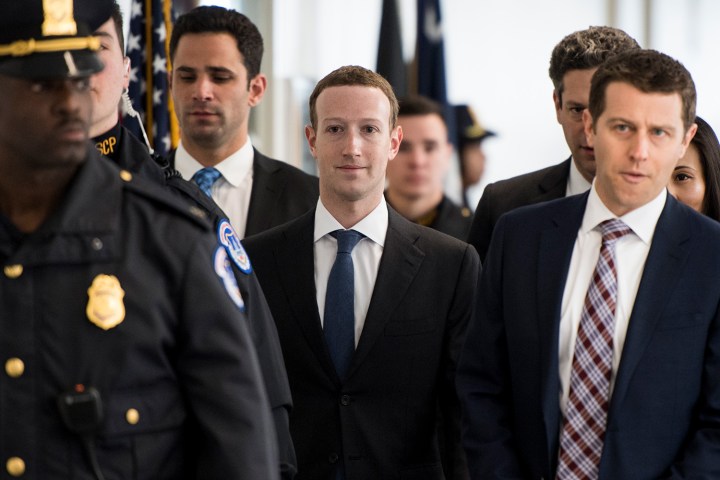
You won’t hear me say this often, but Charter is right.
Charter’s a cable company, and as such, it’s one of the most reviled companies in the U.S. The latest version of the American Customer Satisfaction Index placed cable companies and Internet Service Providers (ISPs) dead last in consumer sentiment, just above that gum you recently picked off the bottom of your shoe. But when it comes to privacy … well, Charter has a point.
Ahead of Mark Zuckerberg’s testimony before Congress on Tuesday, Tom Rutledge, Charter’s chairman and chief executive officer, penned a policy piece arguing that Congress should create privacy laws and regulate how companies like Facebook (and Charter!) take care for our information. Data collection and resale shouldn’t be the default, he said, but an opt-in option for consumers.
“Internet users should have ‘opt-in’ protections, meaning all entities must receive opt-in consent to collect and share their data for purposes other than the actual service they engaged in,” he said. “Additionally, all online entities must be transparent about their information collection and sharing practices by providing concise, easy-to-find, understandable privacy notices to consumers.”
Charter’s right. The default shouldn’t be the ability to sell confidential data, especially given the years of privacy breaches and mistakes by the biggest names in the business, Facebook included. Rutledge isn’t writing this out of the goodness of his heart, of course. Cecilia Kang, a tech reporter for The New York Times, noted that Charter is itself already heavily regulated (and regularly whines about that fact, for what it’s worth). And fair is fair, right?
“The Washington term of art for this is ‘regulatory parity,'” Kang tweeted on Monday. “Translation: If you are going to regulate us, regulate everyone who is playing in the same space, including internet cos.”
The Washington term of art for this is “regulatory parity.” Translation: If you are going to regulate us, regulate everyone who is playing in the same space, including internet cos.
— CeciliaKang (@ceciliakang) April 9, 2018
This would be a massive transformation of the Facebook business model, one that at this point is richly deserved. Many people argue that
But will it happen? April Glaser, a tech and business reporter for Slate, wrote on Twitter Monday night that she had spoken with both Republican and Democratic senators: “Turns out America’s ambient anger at Facebook has long been bipartisan and regulation could be coming.” We’ll see. She also wrote this:
Just got off the phone with a Republican representative who will be questioning Zuck on Wednesday: "The notion that Congress is somehow going to have hearings and then pass a law and "fix facebook," that is not going to happen."
— april glaser (@aprilaser) April 9, 2018
Still, some politicians seem to appreciate the need to act. Senator Bill Nelson, the top Democrat on the Senate Commerce Committee told Reuters after meeting with Zuckerberg that “the message I wanted to convey to him is that if we don’t rein in the use of social media, none of us are going to have any privacy anymore.”
Yet based on the prepared testimony Zuckerberg will read during his appearance before the House Committee on Energy and Commerce today, revisions to Facebook’s business model aren’t on the books. He seems to think an apology is good enough, and the acknowledgement that the company must take steps.
“It’s not enough to just connect people, we have to make sure those connections are positive. It’s not enough to just give people a voice, we have to make sure people aren’t using it to hurt people or spread misinformation,” Zuckerberg says in his statement. Will the company’s “steps” be sufficient to fix the holes in the system that allowed Cambridge Analytica to scrape so much information? Repeated efforts to revise the site’s privacy controls have proven one thing: New controls simply aren’t good enough. Besides, have you seen the current system lately?

Facebook’s Privacy controls at present are designed to let you control who sees what you post. That’s great for keeping my boss out of my beach photos, but it isn’t worth a damn when the one doing the snooping is sanctioned by Facebook.
“We didn’t take a broad enough view of our responsibility, and that was a big mistake,” Zuckerberg said. “It was my mistake, and I’m sorry. I started Facebook, I run it, and I’m responsible for what happens here.”
The comments echo full-page ads Facebook has taken out recently. Will it be enough to sway the public? Is it enough to make a difference? I don’t think so. I’m saying something you won’t hear from me often: The giant, multinational corporation is right.
Listen to Charter, Congress!
Editors' Recommendations
- Facebook’s new privacy tool convinced me to delete my account
- Facebook, Google coronavirus surveys may soon predict outbreaks, researchers say


